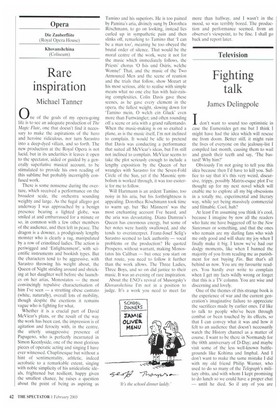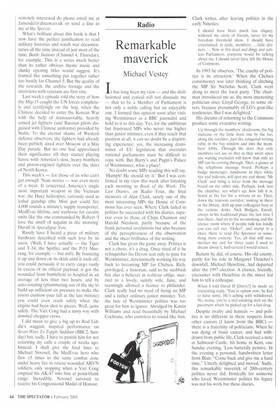Fighting talk
James Delingpole
Idon't want to sound too optimistic in case the Eumenides get me but I think I might have had the idea which will rescue me from doom. Better still, it might ruin the lives of everyone on the jealousy-list I compiled last month, causing them to wail and gnash their teeth and say, The bastard! Why him?'
Obviously I'm not going to tell you this idea because then I'd have to kill you. Suffice to say that it's this very weird, discursive, trippy, possibly Matrix-esque plot I've thought up for my next novel which will enable me to explore all my big obsessions in a totally me, experimental and literary way, while yet being massively commercial and filmable. Cool, huh?
At least I'm assuming you think it's cool, because I imagine by now all the readers who hate me have buggered off to the New Statesman or something, and that the ones who remain are my darling fans who wish me only good and will share my joy when I finally make it big. I know we've had our dodgy moments, like when I banned the majority of you from reading me as punishment for not buying Fin. But that's all behind us now. You are my favourite readers. You hardly ever write to complain when I get my facts wildly wrong or forget that this is a TV column. You are wise and discerning and lovely.
One of the themes of this strange book is the experience of war and the current generation's imaginative failure to appreciate the sacrifices made by earlier ones. I'd like to talk to people who've been through combat or been touched by its effects, so that I can convey what it was and how it felt to an audience that doesn't necessarily watch the History channel as a matter of course. I want to be there in Normandy for the 60th anniversary of D-Day; and maybe visit some of the less well-known battlegrounds like Kohirria and Imphal. And I don't want to make the same mistake I did with my old friend Philip Warner, who used to do so many of the Telegraph's military obits, and with whom I kept promising to do lunch so we could have a proper chat — until he died. So if any of you are
remotely interested do please email me at Jamesdel@dircon.co.uk or send a line to me at the Speccie.
What's brilliant about this book is that I now have the perfect justification to read military histories and watch war documentaries all the time instead of just most of the time. Battle Stations (Channel 4, Thursday), for example. This is a series much better than its rather obvious theme music and clunky opening titles would suggest. It's framed like something put together rather too hastily for Channel 5. But the quality of the research, the archive footage and the interviews with veterans are first rate.
Last week's episode told the story of how the Mig-15 caught the UN forces completely and terrifyingly on the hop, when the Chinese decided to enter the Korean War with the help of manoeuvrable, heavily armed jet fighters (and Russian pilots disguised with Chinese uniforms) provided by Stalin. To the eternal shame of Western defence observers, the fighters had already been publicly aired over MOSCOW at a May Day parade. But no one had appreciated their significance till they started playing havoc with America's slow, heavy bombers and piston-engined fighters over the skies of North Korea.
This week's — for those of us who can't get enough 'Nam stories — was even more of a treat. It concerned America's single most important weapon in the Vietnam war, the Huey helicopter, variously used as lethal gunship (the Mini gun could fire 4,000 rounds a minute), supply transporter, MedEvac lifeline, and warhorse for cavalry units like the one commanded by Robert 'I love the smell of napalm in the morning' Duvall in Apocalypse Now.
Rarely have I heard a piece of military hardware described with such love by its users. (Well. I have actually — the Tiger and T-34; the Spitfire and the P-51 Mustang, for example — but still). By bouncing it up and down on its skids until it took off, you could persuade it to carry cargo vastly in excess of its official payload; it got the wounded from battlefield to hospital in an average of less than two hours; and by auto-rotating (plummeting out of the sky to build up sufficient air pressure to make the rotors cushion your fall at the last minute) you could even crash safely when the engine had been shot to pieces. Well, quite safely. The Viet Cong had a nasty way with downed chopper crews.
I did mean to give a big up to Rod Liddie's waggish. inspired performance on Seven Ways To Topple Saddam (BBC2, Sunday) but, sadly, I have to punish him for not returning my calls a couple of weeks ago. Instead, I shall give the final lines to Michael Novosel, the MedEvac hero who flew 15 times to the same combat zone under heavy fire to rescue wounded ARVN soldiers, only stopping when a Viet Cong emptied his AK-47 into him at point-blank range. Incredibly, Novosel survived to receive his Congressional Medal of Honour.



























































 Previous page
Previous page